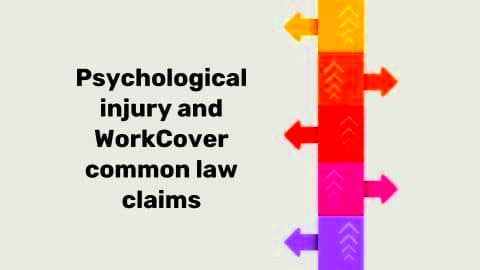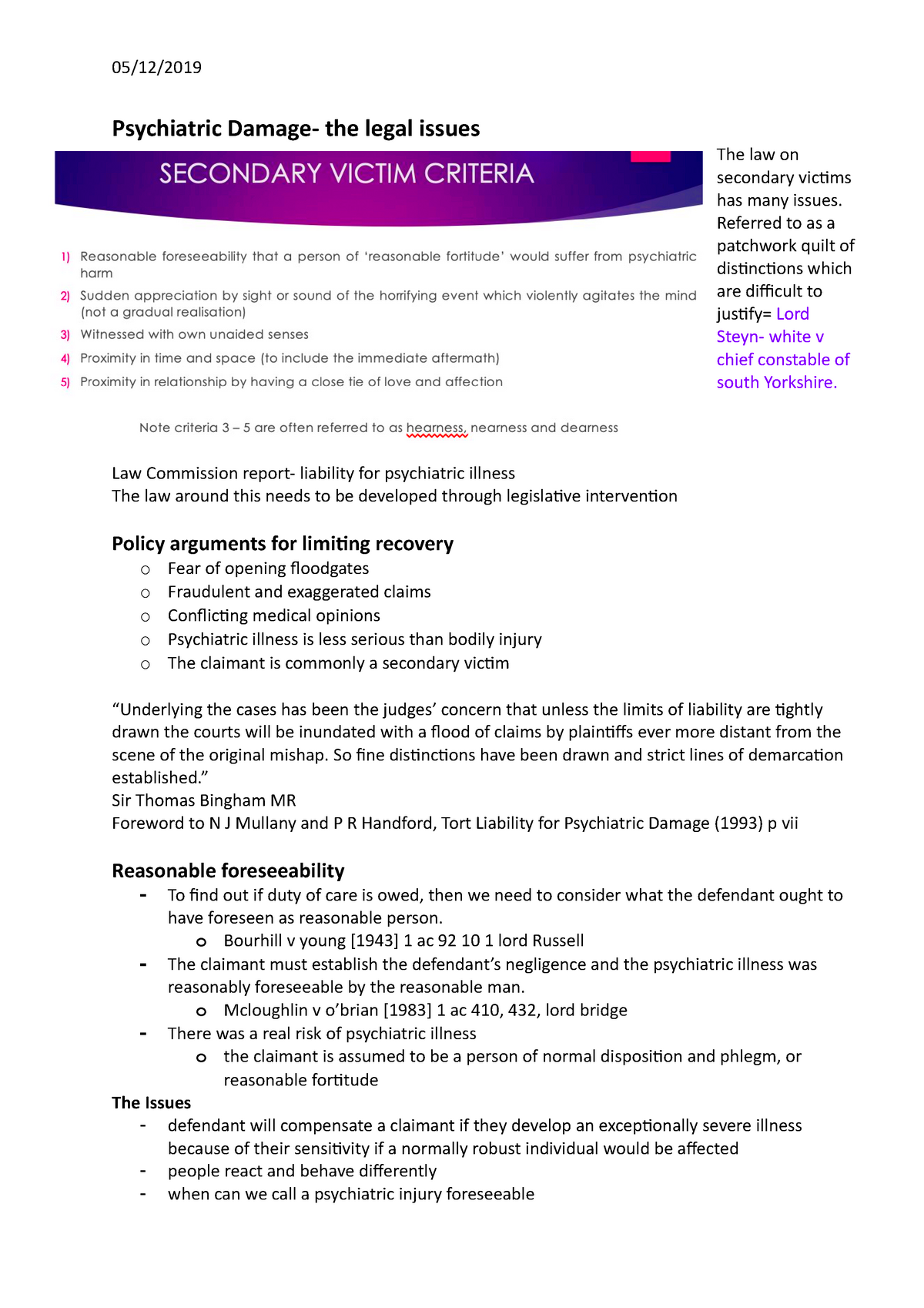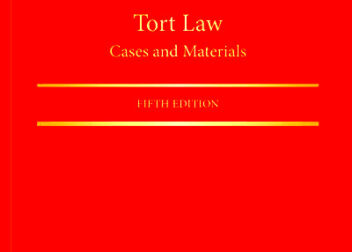Common Law Claims for Psychological Injury and Legal Precedents
Common law claims for psychological injury have gained attention in recent years as our understanding of mental health has evolved. Unlike physical injuries, psychological injuries can be harder to define and prove, yet they can be just as debilitating. In legal terms, these claims aim to provide compensation to individuals who suffer from emotional distress due to someone else’s negligence or intentional actions. This article will explore the intricacies of these claims, the relevant legal precedents, and how they can impact the lives of those affected.
Understanding Psychological Injury in Legal Terms

Psychological injury refers to emotional harm that can arise from various situations, including accidents, workplace incidents, or even harassment. In legal contexts, it often manifests as claims for:
- Post-Traumatic Stress Disorder (PTSD)
- Anxiety Disorders
- Depression
- Emotional Distress
For a psychological injury claim to be valid, the injured party must demonstrate that:
- The defendant owed them a duty of care.
- This duty was breached due to negligence or intentional harm.
- The breach directly resulted in psychological injury.
Understanding these elements is crucial for anyone considering filing a claim. Psychological injuries are often subjective, making it essential for claimants to gather sufficient evidence to support their case.
Legal Precedents Influencing Psychological Injury Claims

Legal precedents play a significant role in shaping how psychological injury claims are evaluated in court. Key cases often serve as benchmarks for future claims. Some notable precedents include:
| Case Name | Year | Summary |
|---|---|---|
| Dulieu v White & Sons | 1901 | This case established that a plaintiff could claim for nervous shock if they were in the immediate vicinity of a traumatic event. |
| Alcock v Chief Constable of South Yorkshire | 1991 | In this case, the court emphasized the need for a close relationship between the claimant and the primary victim to establish a claim for secondary victimization. |
| Page v Smith | 1996 | This landmark decision recognized that claimants could seek damages for psychiatric injuries even if they had not sustained physical injuries. |
These cases highlight the evolving nature of psychological injury claims and set critical standards for proving emotional distress in legal settings. Understanding these precedents can significantly aid individuals contemplating a claim.
Types of Psychological Injury Claims Recognized by Common Law

Common law recognizes several types of psychological injury claims, each with its unique characteristics. Understanding these types can help potential claimants identify their situation and assess their chances of success. Here are the most common categories:
- Negligent Infliction of Emotional Distress: This occurs when a person’s negligent actions cause severe emotional distress to another party. Claimants must show that the defendant had a duty of care and breached it.
- Intentional Infliction of Emotional Distress: In these cases, the defendant’s actions are intentional or reckless, leading to severe emotional trauma. The conduct must be outrageous and extreme.
- Post-Traumatic Stress Disorder (PTSD) Claims: Individuals may seek compensation for PTSD resulting from a traumatic event, like an accident or assault. Medical documentation is critical in these cases.
- Claims Related to Workplace Harassment: Employees may file claims for emotional distress due to harassment, bullying, or hostile work environments. Proof of the harassment’s impact on mental health is essential.
Each claim type has specific requirements and nuances. Understanding these can empower individuals to pursue the appropriate legal action based on their circumstances.
Criteria for Proving Psychological Injury
Proving psychological injury in court can be challenging, but several key criteria help establish a strong case. Here’s what claimants typically need to demonstrate:
- Existence of a Duty of Care: Claimants must prove that the defendant had a legal obligation to act with reasonable care toward them.
- Breach of Duty: The claimant needs to show that the defendant breached this duty, leading to the emotional harm.
- Causation: There must be a clear link between the defendant’s actions and the psychological injury suffered by the claimant. This often requires expert testimony.
- Severity of the Injury: Claimants must provide evidence that the emotional distress is severe and affects their daily life. This can include medical records, therapy notes, and personal testimonies.
Gathering compelling evidence is crucial, as psychological injuries are often less tangible than physical ones. Experts, such as psychologists or psychiatrists, can provide valuable insight into the claimant’s mental state.
Defenses Against Psychological Injury Claims
Defending against psychological injury claims can involve several strategies. Understanding these defenses is essential for both defendants and claimants. Common defenses include:
- Lack of Duty of Care: The defendant may argue that they did not owe a duty of care to the claimant, which is a foundational element of negligence claims.
- Insufficient Evidence: Defendants can challenge the adequacy of the claimant’s evidence. If the claimant fails to provide robust documentation or expert testimony, the case may falter.
- Comparative Negligence: If the claimant contributed to their emotional distress, the defendant might argue that the claimant shares some responsibility, potentially reducing the damages awarded.
- Preexisting Conditions: Defendants may assert that the claimant’s psychological issues existed before the incident in question, arguing that the defendant’s actions did not cause the injury.
Understanding these defenses can help both parties prepare for litigation. It’s essential for claimants to anticipate these arguments and gather sufficient evidence to counter them effectively.
Impact of Recent Case Law on Psychological Injury Claims
Recent case law has significantly influenced the landscape of psychological injury claims. As courts have grappled with the nuances of mental health, several landmark decisions have emerged, shaping how these claims are evaluated. One notable trend is the increasing acceptance of psychological injuries as valid claims in various contexts, including workplace environments and personal injury cases.
For instance, courts have started recognizing the psychological impact of traumatic events, not just physical injuries. This shift means that individuals suffering from emotional distress after accidents, harassment, or other traumatic incidents have a better chance of obtaining compensation. Recent cases also emphasize the importance of:
- Clear Documentation: Courts are more likely to rule in favor of claimants who provide thorough documentation of their psychological injuries, including therapy notes and medical records.
- Expert Testimony: The use of expert witnesses, such as psychologists, has become crucial in establishing the severity of psychological injuries.
- Long-Term Effects: Recent rulings have acknowledged the long-term consequences of psychological injuries, allowing for more substantial damages in some cases.
These trends indicate that as society’s understanding of mental health evolves, so too does the legal framework surrounding psychological injury claims.
Future Trends in Psychological Injury Claims
The future of psychological injury claims looks promising, with several emerging trends that may shape how these cases are handled in the legal system. As mental health awareness grows, we can expect:
- Increased Recognition: More courts are likely to recognize psychological injuries as valid claims, leading to broader acceptance in various legal contexts.
- Enhanced Legal Frameworks: Legislative changes may arise to create clearer definitions and standards for psychological injury claims, making it easier for claimants to navigate the legal system.
- Technological Integration: The use of technology, such as telehealth and online therapy records, may streamline evidence collection and make it easier for claimants to document their injuries.
- Focus on Workplace Mental Health: As workplace mental health becomes a priority, more claims related to emotional distress from workplace harassment and stress are likely to emerge.
These trends indicate that as legal systems adapt, the process for addressing psychological injury claims will likely become more equitable and supportive for those affected.
Frequently Asked Questions
Here are some common questions people have about psychological injury claims:
- What constitutes psychological injury? Psychological injury includes conditions like PTSD, anxiety disorders, and severe emotional distress caused by traumatic events or negligence.
- How do I prove psychological injury? You must show that the defendant had a duty of care, breached that duty, and that this breach caused your psychological injury. Evidence like medical records and expert testimony is crucial.
- Can I file a claim if I didn’t seek therapy? Yes, but having therapy records strengthens your case. If you didn’t seek treatment, be prepared to explain why and provide other evidence of your distress.
- What if the defendant argues that I had preexisting conditions? The defendant may try to use this as a defense, but if you can show that their actions aggravated your condition, you may still have a valid claim.
- How long do I have to file a claim? The time limit varies by state, so it’s essential to consult with a lawyer to understand the statute of limitations for your specific situation.
These questions can help clarify common concerns and guide individuals considering a psychological injury claim.
Conclusion on Common Law Claims for Psychological Injury
In conclusion, common law claims for psychological injury are an essential part of the legal landscape, providing a pathway for individuals suffering from emotional distress due to the negligence or intentional actions of others. As societal understanding of mental health continues to evolve, so too does the legal framework governing these claims. Recent case law has paved the way for increased recognition and acceptance of psychological injuries, making it crucial for claimants to understand their rights and the evidence needed to support their claims. By staying informed about the types of claims, criteria for proving psychological injury, and potential defenses, individuals can navigate this complex area of law more effectively. Ultimately, the journey towards justice for psychological injury victims is becoming more accessible and just, reflecting a growing acknowledgment of the profound impact mental health has on individuals’ lives.


